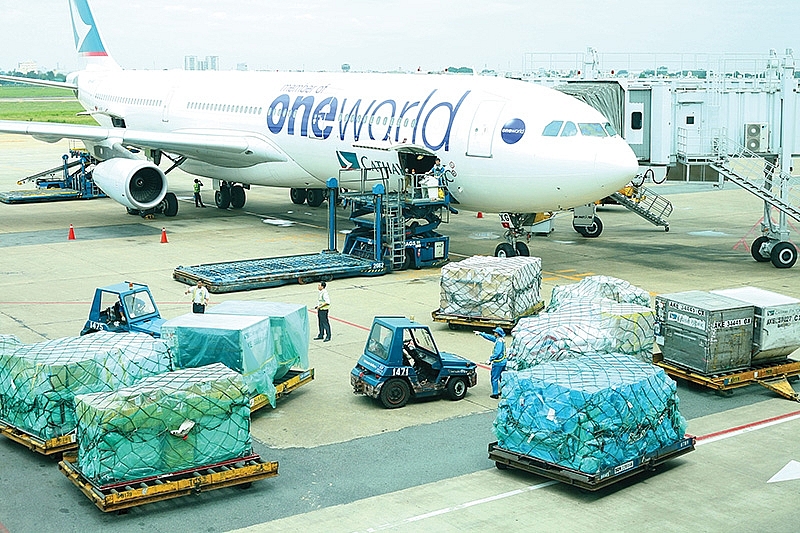Swedish influence extends to aviation
 |
| The loan has been proposed in order to upgrade and expand airports, photo Le Toan |
Vietnam’s Minister of Transport Nguyen Van The has worked with a group of Swedish businesses led by Sweden’s Ambassador to Vietnam Ann Måwe on the $2 billion loan and future possibilities of cooperating in aviation projects.
The mission, including tech titans like Ericsson and ABB, is hunting for business openings in airports, especially the to-be-built Long Thanh International Airport, Terminal 3 at Tan Son Nhat International Airport, and upgrades in other areas.
Denis Brunetti, president of Ericsson in Vietnam, Myanmar, Cambodia, and Laos, said that the group is part of the Business Sweden consortia of companies that has joined together to support the Long Thanh project in the future.
“Ericsson believes that 5G digital infrastructure will help make the proposed Long Thanh airport, as well as all other airports across Vietnam, more efficient and productive through the benefits of resilient, secure, low latency, and high speed/bandwidth 5G mobile data connectivity,” he told VIR.
Ericsson focuses on leveraging the power of 5G to digitally transform industries and enterprises across multiple sectors including transport, manufacturing, agriculture, healthcare, and education. In the aviation sector particularly, Ericsson has played a key role in digitally transforming Charles de Gaulle International in Paris, to leverage 4G/5G mobile broadband connectivity.
Similarly, Swedish-Swiss robotics and automation powerhouse ABB is venturing further into Vietnam, including in aviation.
According to experts, the door to join the $16 billion Long Thanh airport initiative and others will open widely for Ericsson, ABB, and others if the loan proposal is approved by the Vietnamese government. Under the proposal, 30 per cent of the loan will be used for Swedish equipment, products, and services.
In May last year, at a meeting between Prime Minister Nguyen Xuan Phuc and Swedish counterpart Löfven in Sweden, the host proposed a $1 billion loan for Vietnamese aviation. Swedish Export Credit Agency and Swedish Export Credit Corporation proposed to increase the credit to $2 billion for upgrading and expanding airports, expansion of air traffic management, and for Long Thanh International Airport and Terminal 3 at Tan Son Nhat International Airport.
A source from state-owned Airports Corporation of Vietnam, the investor of Long Thanh airport, said that the first construction item of the nearly $5 billion first stage will be kicked off this month.
A senior official of the Ministry of Transport told VIR, “International businesses are able to join services, repair and maintenance, catering services, hangars, and airport hotels in the Long Thanh airport project.”
Besides Long Thanh and Tan Son Nhat airports, Vietnam is planning to upgrade and build many others such as upgrading of Noi Bai International Airport from current annual capacity of 30 million passengers to 100 million, as well as Lao Cai, Van Don, Phu Quoc, and Chu Lai airports. Therefore, the country is in high need of equipment and other solutions, thus opening more chances for many international businesses.
This is an advantage for Sweden, as one of the world’s leaders in providing technology solutions for aviation to support its sustainable development. According to the ambassador, among the 28 airports worldwide are rated as the most environmentally friendly, 10 have management and operation solutions supplied by Swedish firms.
While Swedish investment in Vietnam remains modest in comparison with other partners in the EU, ranking 43rd with about $4.5 million worth of the total registered capital in the first 11 months of 2020, their interest in technology businesses in the country has intensified.
More than 70 Swedish companies are operating in Vietnam, with many being world-leading players such as AstraZeneca, Atlas Copco, Electrolux, H&M, IKEA, Volvo, and Tetra Pak, among others.
More opportunities could come for Swedish technology firms on the back of the Vietnamese government’s acceleration of digital transformation among state-run agencies and business community, as well as the EU-Vietnam Free Trade Agreement (EVFTA) thanks to its higher commitments in telecommunications than those in the World Trade Organization (WTO).
For instance, Vietnam offers permission of establishment of 100 per cent foreign-invested enterprises in non-network infrastructure and value-added telecommunications services after five years of the agreement’s entry into force. Meanwhile in WTO commitments, only joint ventures are permitted with a foreign ownership limit of 65 per cent. In regard to basic telecommunications services, that limit will be raised to 75 per cent for services without network infrastructure after five years of performance of the EVFTA, in comparison with 70 per cent in the WTO.
What the stars mean:
★ Poor ★ ★ Promising ★★★ Good ★★★★ Very good ★★★★★ Exceptional
 Tag:
Tag:
Related Contents
Latest News
More News
- Vietnam sets ambitious dairy growth targets (February 24, 2026 | 18:00)
- Masan Consumer names new deputy CEO to drive foods and beverages growth (February 23, 2026 | 20:52)
- Myriad risks ahead, but ones Vietnam can confront (February 20, 2026 | 15:02)
- Vietnam making the leap into AI and semiconductors (February 20, 2026 | 09:37)
- Funding must be activated for semiconductor success (February 20, 2026 | 09:20)
- Resilience as new benchmark for smarter infrastructure (February 19, 2026 | 20:35)
- A golden time to shine within ASEAN (February 19, 2026 | 20:22)
- Vietnam’s pivotal year for advancing sustainability (February 19, 2026 | 08:44)
- Strengthening the core role of industry and trade (February 19, 2026 | 08:35)
- Future orientations for healthcare improvements (February 19, 2026 | 08:29)






















 Mobile Version
Mobile Version